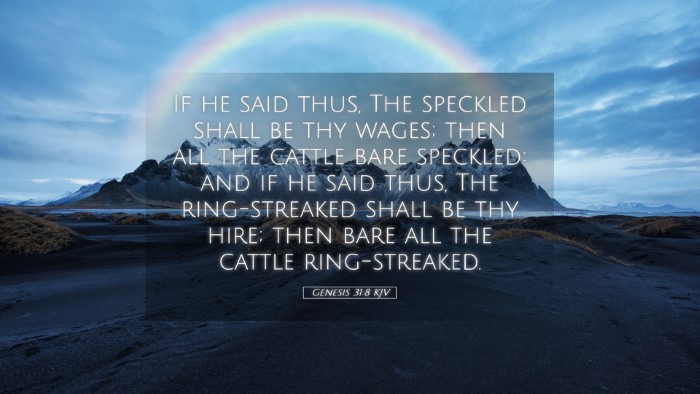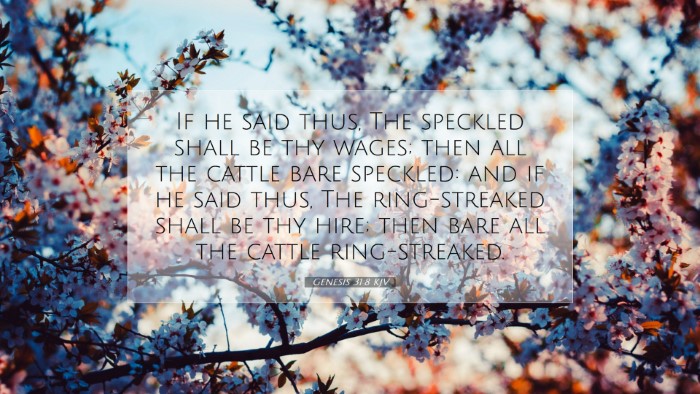Commentary on Genesis 31:8
Verse: "If he said thus, The speckled shall be thy wages; then all the cattle bare speckled." (Genesis 31:8)
Introduction
The narrative surrounding Genesis 31:8 is set against the backdrop of Jacob's dealings with his father-in-law, Laban. This verse captures the intricacies of Jacob's strategies in livestock breeding that God used to prosper him despite Laban's deceitfulness. The wealth gained is significant in understanding God's provision and the fulfillment of promises made to Jacob.
Contextual Background
Jacob had served Laban for many years, and during this time, he had been deceived and taken advantage of in various ways. While Laban had initially promised Jacob a reward for his service, the terms changed repeatedly, leading to familial and economic strife. This verse illuminates a pivotal moment where Jacob navigates his relationship with Laban and God's favor.
Theological Insights
Understanding the theological implications of this verse requires a careful examination of key themes:
- Divine Providence: Jacob's prosperity was not merely through shrewdness but significantly through God's direct intervention. This verse points towards God's ability to supernaturally influence situations.
- God's Faithfulness: God's promises to Jacob in earlier chapters are reinforced through his growing wealth, demonstrating that God is faithful to His covenant.
- Human Agency: While divine providence is paramount, Jacob's strategic approach highlights the balance of faith and works. He did not merely wait for God; he took action guided by divine principles.
Commentary by Matthew Henry
Matthew Henry, known for his thorough exegesis, highlights that Jacob’s opportunity gave him a chance to demonstrate his trust in God’s promises. He notes that the phrase "if he said thus" indicates Jacob’s awareness of Laban's deceptive practices and the manipulation involved in his wage negotiations. According to Henry, this was a pivotal moment where Jacob placed his trust in God’s providence rather than in Laban's promises, resulting in his ultimate success.
Insights from Albert Barnes
Albert Barnes emphasizes the significance of the specific conditions laid out by Laban and how Jacob’s strategic breeding was a reflection of his faith in God's promise. Barnes explains how Jacob utilized techniques that were in harmony with the natural behavior of the livestock, showcasing a blend of skill and divine blessing. The verse illustrates how God empowered Jacob's actions, turning the situation toward his favor.
Perspectives from Adam Clarke
Adam Clarke delves into the breeding techniques employed by Jacob, pointing out that his method was not only innovative but also divinely inspired. Clarke notes that the speckled livestock were a product of God’s handiwork in fulfilling the promise made to Jacob. He stresses the necessity to acknowledge the spiritual dimension of Jacob's success, attributing it ultimately to God's overarching plan and faithfulness to Jacob and his descendants.
Practical Applications
For pastors, students, and theologians, Genesis 31:8 offers profound lessons:
- Trust in God: Like Jacob, believers are called to trust in God’s providence amid adversity. Even when faced with manipulation and deceit, God is sovereign and attentive to our needs.
- The Balance of Faith and Works: Jacob's experience teaches that faith is dynamic and often requires active engagement in our circumstances. Surrendering to divine will does not preclude the use of wisdom and strategy.
- Covenantal Faithfulness: This verse strengthens the understanding of God's faithfulness to His people. It serves as a reminder of the blessings that stem from living in alignment with God’s promises.
Conclusion
Genesis 31:8 encapsulates a critical moment in Jacob's life, reflecting themes of divine providence, human agency, and covenantal faithfulness. This verse not only illuminates the historical narrative but also provides deep spiritual insights applicable to contemporary believers seeking to navigate their lives with faith and integrity. Through the lens of commentaries by Matthew Henry, Albert Barnes, and Adam Clarke, the richness of this passage encourages a holistic understanding of God’s work in the lives of His people.


